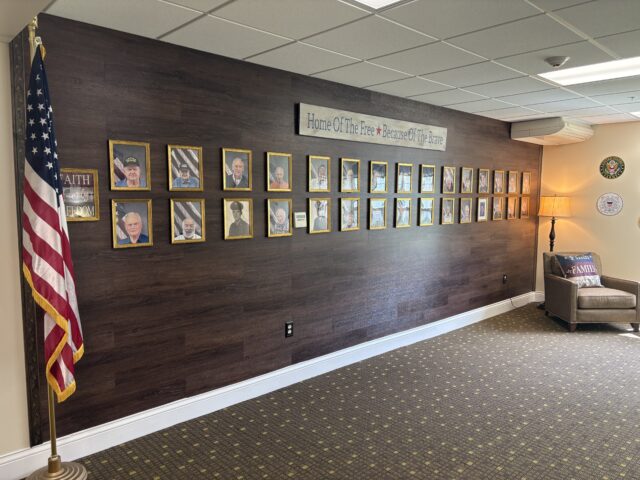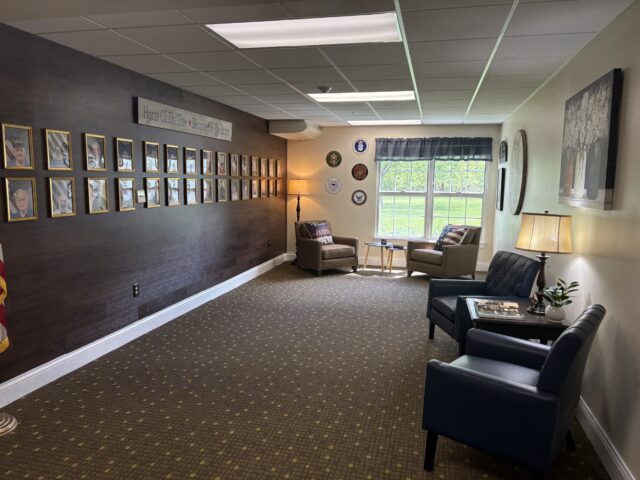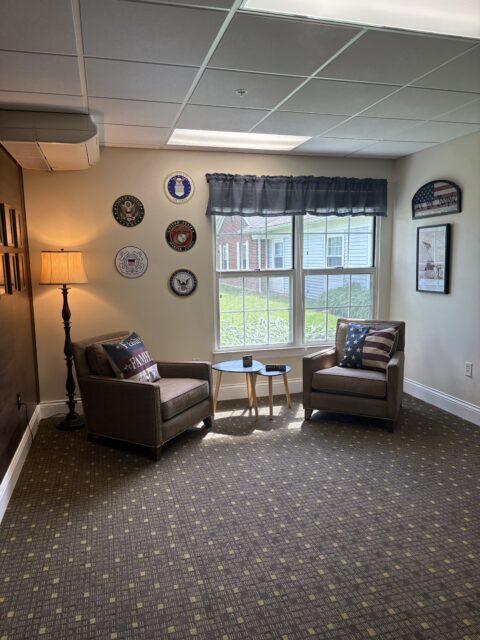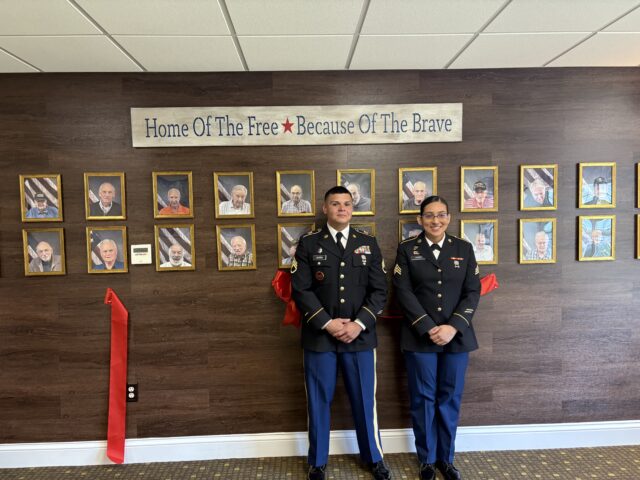Caregiver Guilt in Memory Care
Maybe you’re trying to repay them after everything they’ve done for you. Or maybe you’re hesitant to trust someone else with their care. Or maybe your loved one just flat-out refuses additional help from a memory care community. Whatever the situation, being the primary caregiver for a family member with dementia is hard. And feelings of guilt are likely to creep in along the way.
What is Caregiver Guilt?
Caregiver guilt is an extremely real and painful experience, and it comes in many different forms. Feeling overwhelmed with the responsibilities of caregiving, feeling impatient with your loved one, or even blaming yourself for things that have happened are common. Guilt can often lead to feelings of shame, depression, anxiety, anger, and even resentment towards the person you’re caring for.
The realization that you are no longer able to care for your loved one with dementia is an unsure and overwhelming process. It’s tough to let go and turn to additional support, especially when your loved one is refusing. Caregiver guilt can have real consequences for the relationship with your loved one if it goes on too long. But at the end of the day, you must do what’s best for both of you. Their health and safety matter most, and so does your well-being .
How to Cope
A dementia diagnosis flips your world upside down, and realizing that you can no longer care for your family member is a lot to bear. Fortunately, there are ways to cope with the guilt you are dealing with.
- Be kind to yourself: Remind yourself that guilt, shame, and resentment are perfectly normal emotions for caregivers to experience. It’s a challenging process to watch the progression of dementia in your loved one.
- Seek out support: Join a support group or talk to others in similar situations to gain perspective, process your emotions, and learn that you’re not alone in this journey.
- Prioritize self-care: Take time for yourself—it’s not selfish. Participate in your favorite hobbies or consider journaling to alleviate stress and manage your feelings.
- Give it time: Adjusting to a new environment takes time—for both you and your loved one. It’s a gradual process, and it’s okay if it doesn’t happen overnight.
- Believe it’s for the best: It’s never going to be an easy decision to loosen the reins and accept help; however, know that you will be improving the quality of life for your loved one, both medically and socially.
Memory Care
After deciding that additional support is needed, you’ll probably ask yourself: What now?
As dementia progresses into the later stages, it may be time to consider memory care. Memory care communities are designed to meet the needs of individuals facing cognitive impairment, such as Alzheimer’s and other forms of dementia.
Our team at Orchard Heights is specially trained to focus on the unique strengths and needs of every resident. Your loved one will receive personalized care and assistance with activities of daily living (ADLs), such as bathing, grooming, and dressing. Additionally, on-site nursing staff are available to address any health concerns that arise, providing you with both comfort and peace of mind.
Our community is dedicated to creating a warm, comfortable, and safe space where your loved one can feel right at home. We also offer around-the-clock memory care activities schedule intended to stimulate the mind and ensure that every resident is left entirely fulfilled. Some of these activities include daily exercise programs, classes, clubs, music therapy, and various memory care games.
At Orchard Heights, our memory care community offers more than just a place to live — it’s a new beginning filled with meaningful possibilities. We understand that the transition into memory care can be a challenging and emotional decision. That’s why we’re here to walk alongside your loved one on their dementia journey, offering compassionate support every step of the way. Contact us today!
Stages of Dementia and Activity Levels
A dementia diagnosis can be very intimidating to individuals and their families. It signals a decline in cognitive abilities, and there isn’t a cure for most memory disorders. Many also fear that the individual affected will no longer be able to engage in activities for their enjoyment or benefit.
People with memory care disorders at all stages can still enjoy activities, even if that participation looks different. Dementia is a memory disorder that refers to the loss of memory, language, and cognitive abilities that affects the ability to function in everyday life. It’s important to know the stages as well as the activities and levels of participation that are best for each stage.
Early-Stage Dementia:
Individuals who are impacted by early-stage dementia may still be able to function independently. Although seniors may still participate in their daily routine, caregivers may start to notice signs of memory decline, like misplacing keys. Symptoms start to have some impact on a senior’s life.
Other common symptoms include:
- Memory Lapses: forgetting or losing items around the house, frequent difficulty finding the right word in conversation, inability to recall recent events
- Difficulty in Planning and Problem-Solving: confusion is more common, and individuals affected by dementia have trouble planning and making complex choices
- Increasing Irritability or Anxiety: mood changes may arise at this stage, where anxiety and depression become more common. Signs of these mood changes include withdrawal from hobbies or socialization and lack of self-confidence.
In the early stages, most seniors can still participate in regular recreational activities. Memory impairment may become evident, especially with memory-related games. Activities that are most beneficial at this stage involve storytelling, memory activities such as word searches and puzzles, and self-expression activities such as painting or singing along to music. Though practicing memory activities may seem counterintuitive, it can be helpful for people with dementia to jog their memory.
Middle-Stage Dementia:
The middle stage of dementia presents changes and symptoms that become much more noticeable, especially to family and friends of those affected. At this point in the disease, many individuals need either reminders or physical assistance with completing activities of daily living (ADLs). Common ADLs include bathing, dressing, and toileting.
Symptoms of Middle-Stage Dementia include:
- Memory Decline: During the middle-stage of dementia, seniors can have difficulty recognizing people in their lives, and repetition of the same question is common. They may also forget basic information about themselves, such as their phone number, age, and home address.
- Confusion Increases: At this stage, seniors with dementia often become more easily disoriented about their surroundings and the time of day, which can increase the risk of wandering.
- Hallucinations and Delusions: Middle-stage dementia often presents issues related to paranoia and seeing or hearing things that are not real. Common delusions among seniors with dementia are that someone is stealing from them or that a lover is cheating on them.
During the middle stage of dementia, many people still desire to participate in recreational activities but may need prompting to start or continue engagement. The best activities for this stage include cognitive skills (such as daily living tasks like folding laundry), easy physical activities such as guided walks, memory activities like watching an old movie, and sorting.
Late-Stage Dementia:
Late-stage dementia has a profound impact not only on those living with the condition but also on their caregivers. At this point, individuals need full-time, 24/7 care around the clock and require physical assistance with every activity of daily living. It’s very common to see drastic personality changes and a loss of ability to control their own movement or respond to the world around them.
Symptoms include:
- Difficulty or loss of ability to communicate
- Increased emotional distress, restlessness, and fear
- Physical immobility: difficulty walking, eating, and swallowing, and incontinence is common at this stage
Individuals who are at the severe stage of dementia have limited abilities to communicate and experience increased emotional difficulty due to memory loss. At this stage, activities should be focused on providing sensory comfort and gentle stimulation to impacted individuals. Even when seniors with dementia can no longer communicate, they may still enjoy and benefit from sensory activities, making engagement especially important at this stage.
Some activities that best support seniors at this stage are gentle stretches, pet therapy, holding hands, and looking at old photos. Social interaction is still important at this stage, regardless of the affected senior’s ability to talk. Friends, family, and caregivers can accomplish this by telling stories or reading to their loved one as well.
Despite the challenges that dementia brings, people with dementia can still find comfort and enjoyment from participating in recreational activities that are fun and mindful of their abilities. It is important to consider that some activities may have to be significantly modified to meet the needs of individuals with moderate to severe dementia, as their cognitive and physical abilities will decline over time. In addition, during the progression of the disease, they may show disinterest in hobbies they’ve previously enjoyed, so new activities may have to replace old ones – and that is totally okay!
Though a dementia diagnosis can be challenging for seniors and their families, recreational activities are a great way to navigate those difficulties and provide stimulation and enjoyment. By utilizing activities that play to the individual’s strengths and capabilities, memory care residents and their caregivers can see positive outcomes. Our community can offer great assistance for dementia residents and their families, providing activities that are tailored to the needs and capabilities of seniors with dementia. Orchard Heights offers 24/7 recreational activities designed for cognitive impairment, providing a variety of entertainment and engagement that has something for every resident. If you or your loved one is struggling with a memory care disorder, we can help. Reach out to us today to book a tour!
Orchard Heights Unveils Freedom Lounge
All New Freedom Lounge
Orchard Heights proudly unveiled its newly transformed Freedom Lounge, a space dedicated to honoring the community’s veteran residents. Once the facility’s art room, the renovated lounge is now a welcoming and peaceful space for veterans to relax, reflect, and connect. The unveiling ceremony, held at 2:30 p.m., was attended by residents, staff, and special guests, including the Mayor of Orchard Park.
“We are proud to recognize the men and women who have served our country,” said Tami Jo Smith, Executive Director, at Orchard Heights. “The Freedom Lounge is a space of gratitude—created to honor their service, their stories, and their continued contributions to our community.”
As part of its ongoing commitment to veterans and their families, Orchard Heights is pleased to invite the public to an informational session on Tuesday, June 17, 2025, from 6:30 PM to 8:00 PM. The session will be led by Robert Stutz, Outreach Specialist from the New York State Division of Veterans’ Services, and will focus on state and local benefits available to veterans and surviving spouses. Special emphasis will be placed on the VA Aid and Attendance Pension Benefit, which can help offset the cost of Assisted Living Care.
This event is free and open to the public. Veterans, spouses, family members, and caregivers are encouraged to attend. Attendees will also have the opportunity to tour Orchard Heights’ community and learn more about how we serve and support our veteran residents.
For more information or to RSVP, please contact Tami Jo Smith at 716-662-0651 or TJSmith@OrchardHeights.com.
Assisted Living: What is it and When is it Needed?
Understanding Assisted Living
Caring for loved ones as they grow older is a meaningful way to give back and express your love and compassion; however, providing that care often becomes more and more challenging as they continue to age. This could be a sign that it is time to seek the added support and care that assisted living has to offer.
What is Assisted Living?
Assisted living is a type of residential care designed for seniors who need assistance with activities of daily living (ADLs). In our senior living community, residents have access to staff for emergency assistance and receive support with various daily tasks, such as eating, dressing, and bathing.
Residents in assisted living have the option of as much assistance as they would like, while also giving them the opportunity to maintain a sense of independence. Our community provides additional personal care services, including housekeeping services, laundry, and transportation.
Assisted living facilities are more than just a place to live, but rather a community to thrive. At Orchard Heights, we offer a wide range of top tier services and amenities for residents to indulge in, such as an on-site beauty salon and barbershop, beautiful outdoor patios and walking paths, and The Orchard Store! Our residents can also participate in daily events and recreational activities.
When is it time for Additional Care?
So, when is it time to consider assisted living?
There is a wide range of reasons to consider additional help. Have you noticed a decline in your loved one’s health? Are you struggling to maintain their health on your own? Are they combating loneliness? If you answered yes to any of these questions, assisted living may be a strong contender when finding the external support your loved one deserves.
Assisted living is a suitable option for seniors who are finding it difficult to live independently. These individuals may struggle with mobility or fine motor skills, have recently suffered from an injury or health emergency, or are in the early stages of memory impairment.
Additional signs that a loved one may be ready for assisted living include unpaid bills, isolation, noticeable weight loss, and a decline in cleanliness or hygiene—all signs of self-neglect. They could simply want or need assistance with tasks ranging from cooking and housekeeping to getting dressed or using the bathroom in the middle of the night.
No matter the reason, assisted living communities offer peace of mind to both seniors and those closest to them, knowing that a team of trained staff members is always nearby if needed.
Assisted living ensures that your aging loved one receives the attention and care that they deserve, while also providing you with the peace that you deserve. Transitioning into senior living may be a daunting task, but it could be the absolute best decision for you and your loved one.
At Orchard Heights, we’re here to support you and your family every step of the way, making the assisted living in Orchard Park, NY journey as smooth and comforting as possible. Schedule a private tour today!





